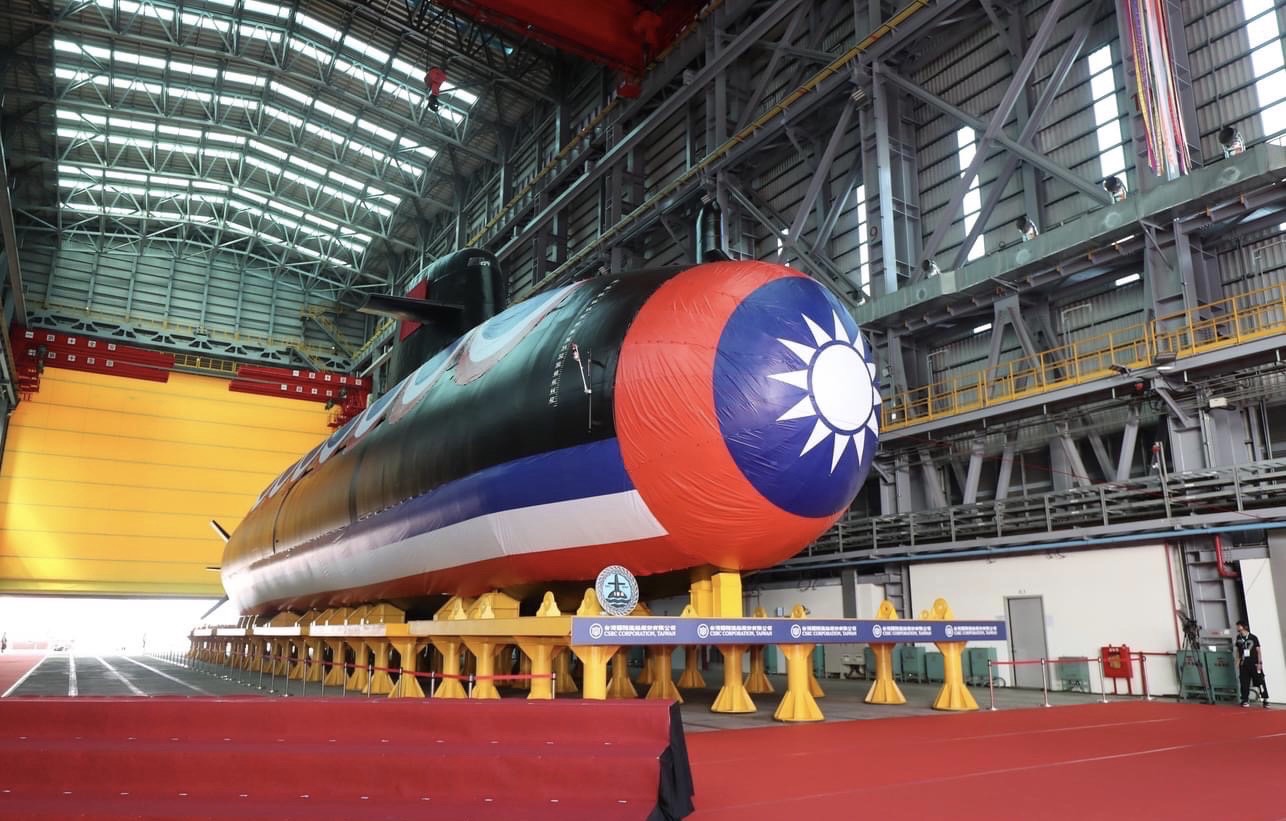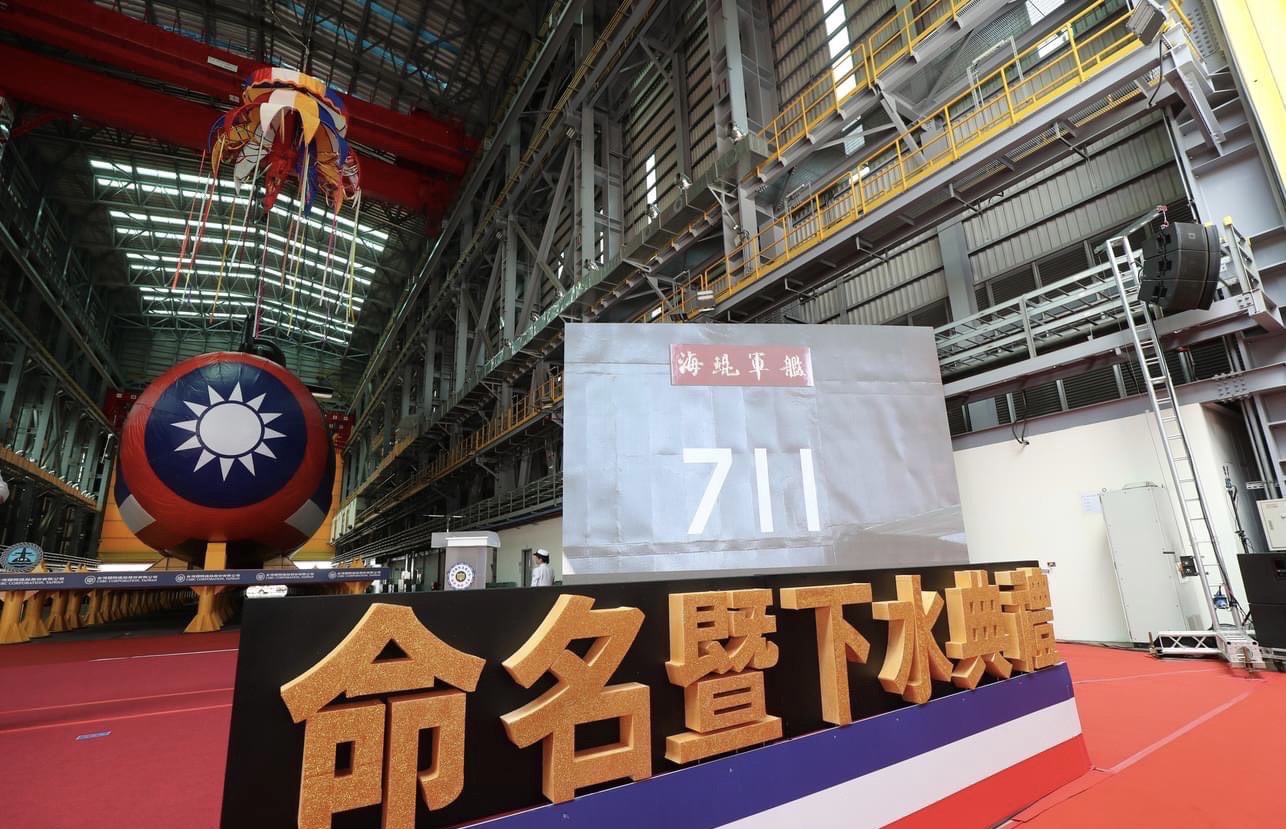by Brian Hioe
語言:
English
Photo Credit: 國防部發言人/Facebook
WITH THE LAUNCH of Taiwan’s first domestically manufactured submarine, the Narwhal or Hai Kun, last week this has become a matter of national pride for many. In particular, this has been framed in much domestic commentary as an accomplishment for Taiwan at a time when Taiwan seeks to shore up its defenses to deter the threat of a Chinese invasion.
Likewise, it is probable that the submarine’s construction will be framed as an accomplishment of the Tsai administration in election campaigning by the DPP. After all, the majority of the submarine’s construction process took place under the Tsai administration, even if the plans for its construction were originally announced in 2014 when the Ma administration held power.
The KMT is currently leaning into a political narrative that the DPP has endangered Taiwan by unnecessarily provoking China, leading to measures such as the re-extension of the military draft. To this extent, KMT presidential candidate Hou You-yi floated the idea of reducing the draft back to four months before dropping the idea earlier this election cycle. Nevertheless, the KMT is less likely to attack the submarine program publicly.
 Photo credit: 國防部發言人/Facebook
Photo credit: 國防部發言人/Facebook
Namely, the KMT traditionally leveraged on veterans as one of the demographics that supported it, going back to the military’s role as the enforcers of the KMT’s political will during the authoritarian period. The Tsai administration has undertaken efforts to rehabilitate the military’s image because of the need to defend from China. As such, the KMT is unlikely to directly attack the submarine program.
It may not be surprising, then, that the pan-Green politicians have criticized members of the pan-Blue camp for what they frame as efforts to obstruct the program–or even directly leaking military secrets about the submarine to China.
In particular, a political firestorm erupted after Indigenous Defense Submarine program head Huang Shu-kuang criticized “certain legislators” for seeking to obstruct the program during the launch ceremony for the submarine. Afterward, DPP legislator Wang Ting-yu stated that some companies involved in the bidding process for the construction of the submarine backed out because of pressure from China, while fellow DPP legislator Chao Tien-lin stated that some legislators had sought to freeze funding for the submarine and made photocopies of the contract for the submarine. DPP legislator Cheng Yun-peng urged for a legal investigation into those who had been involved in potentially breaching the National Security Act and the Classified National Security Information Protection Act by leaking information.
Retired navy captain Kuo Hsi later made public remarks that KMT legislator Ma Wen-chun was the individual in question who had been involved in leaking military secrets to the national security agencies of other countries. Kuo stated that Ma had been a friend and that he had given materials to Ma for reference, but that he could no longer stay silent, and that he would be suing Ma for national security violations. Ma accused Huang of seeking to make such allegations in order to ensure a higher budget for the submarine program during the Tsai administration’s last years in office, while criticizing the Tsai administration for not reining in Kuo.
Kuo stated that how Ma leaked information, using computers, printers, and other means, was documented. To this extent, Kuo stated that foreign specialists involved in submarine development were arrested after returning to their home countries, proving that Ma leaked such information.
Sensitive technology transfers are needed for the construction of a submarine, but one of the obstacles that Taiwan has traditionally faced with regard to arms technology transfers or arms purchases is the prevalence of former military officials–or even potentially elected politicians–that leak secrets to China. This occurs not only because the Chinese government courts former military officials, but because of ROC nationalism.
 Photo credit: 國防部發言人/Facebook
Photo credit: 國防部發言人/Facebook
Critics of Ma have pointed out that such incidents make it all the more unlikely that sensitive technology transfers to Taiwan would occur in the future, likely hoping that the present wave of national pride over the submarine’s construction can be an occasion to tighten laws or call attention to the issue.
Kuo’s allegations also raise the possibility that the development of some military technologies is obstructed internally in the Taiwanese military or government because of leaks, or the targeting of experts. It is unclear whether this merely applies to just submarines or to other weapons.
Indeed, amendments to the National Security Act to increase penalties for leaking military secrets are currently discussed in the Legislative Yuan, with enough signatures having been collected for this. Punishments for minor drug offenses, such as cannabis use, are often more severe than the penalties for individuals who leak national security secrets. It may be the aim of pan-Green legislators to use the launch of the domestically constructed submarine as momentum for such legal changes, then. It is to be seen if this takes place.

